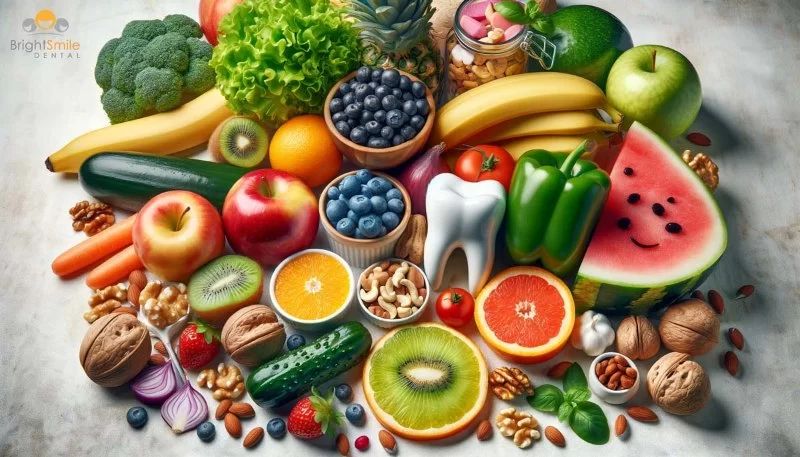
- #understanding-the-relationship-between-food-and-tooth-decay
- #best-foods-to-avoid-tooth-decay
- #foods-to-avoid-that-can-cause-tooth-decay
- #healthy-eating-habits-for-optimal-dental-health
- #real-life-stories-of-tooth-decay-prevention-through-diet
- #how-family-dentistry-online-can-help-you-maintain-oral-health
1. Understanding the Relationship Between Food and Tooth Decay
Tooth decay is a common problem that affects people of all ages, and it’s often linked to our diets. When we eat sugary or acidic foods, bacteria in our mouths use the sugars to produce acids that attack tooth enamel. Over time, this can lead to cavities and more serious dental problems. Understanding how food impacts tooth health is essential for prevention, and by choosing the right foods, you can significantly reduce your risk of tooth decay.
While good oral hygiene is crucial, what you eat also plays a significant role in keeping your teeth healthy. In this article, we will explore the best foods to avoid tooth decay, as well as some dietary changes that can strengthen your teeth and gums. With the right eating habits, you can help prevent tooth decay and maintain a bright, healthy smile for years to come.
2. Best Foods to Avoid Tooth Decay
2.1 Dairy Products
Dairy products like milk, cheese, and yogurt are packed with calcium and phosphates, which are essential for maintaining strong tooth enamel. These nutrients help neutralize acids in the mouth, prevent tooth erosion, and even assist in repairing damaged enamel.
Cheese, in particular, has been found to help increase saliva production, which helps wash away food particles and neutralize acids. Additionally, the casein protein in cheese helps remineralize tooth enamel, making it more resistant to decay.
2.2 Leafy Greens and Vegetables
Leafy greens like spinach, kale, and collard greens are rich in vitamins and minerals that support overall dental health. These vegetables are high in fiber, which helps stimulate saliva production, essential for neutralizing harmful acids in the mouth.
Vegetables like carrots and celery are also great for your teeth because they are crunchy, helping to scrape away plaque as you chew. These high-water-content vegetables also help keep your mouth hydrated, preventing dry mouth, which is a common risk factor for tooth decay.
2.3 Whole Grains
Whole grains like brown rice, oats, and whole wheat bread are another important food group for maintaining tooth health. They contain more fiber than refined grains, which help to scrub away plaque and promote saliva production. Whole grains also provide a steady source of energy for your body without spiking your blood sugar levels, which can contribute to tooth decay if consumed in excess.
2.4 Apples and Other Crunchy Fruits
Fruits like apples, pears, and berries are packed with vitamins, antioxidants, and fiber. Apples, in particular, are known for their ability to stimulate saliva production, which helps wash away food particles and bacteria that can lead to tooth decay. Chewing these fruits also helps clean teeth by scrubbing away surface plaque.
Many fruits are also rich in vitamin C, which helps maintain healthy gums and prevents gum disease, a condition that can contribute to tooth decay if left untreated.
3. Foods to Avoid That Can Cause Tooth Decay
3.1 Sugary Snacks and Beverages
Foods and drinks high in sugar are one of the leading causes of tooth decay. When you consume sugary snacks or beverages, the bacteria in your mouth feed on the sugar, producing acids that can erode tooth enamel. This includes not only obvious sweets like candy and pastries but also sugary drinks like soda and fruit juices.
To reduce the risk of tooth decay, try to limit sugary snacks and drinks, and if you do consume them, be sure to rinse your mouth with water afterward. Better yet, try to enjoy these treats as part of a meal, as the increased saliva production during meals can help neutralize acids and wash away sugars.
3.2 Starchy Foods
Starchy foods like chips, bread, and crackers are not only high in carbohydrates but can also get stuck between your teeth, providing a breeding ground for bacteria. These starches can turn into sugars in your mouth, contributing to acid production and plaque buildup, which leads to tooth decay.
Try to limit your intake of starchy foods and opt for healthier alternatives like whole grains. If you do eat starchy snacks, be sure to brush and floss afterward to prevent them from sitting on your teeth and contributing to decay.
3.3 Acidic Foods
Acidic foods, such as citrus fruits and tomatoes, can be harmful to tooth enamel if consumed in excess. While these foods are rich in vitamins, the high acidity can erode enamel over time, leading to sensitivity and an increased risk of cavities.
To protect your teeth, try to enjoy acidic foods in moderation and rinse your mouth with water afterward to neutralize the acids. Avoid brushing your teeth immediately after consuming acidic foods, as this can further damage softened enamel.
4. Healthy Eating Habits for Optimal Dental Health
4.1 Drink Plenty of Water
Water is essential for maintaining good oral health. It helps wash away food particles, bacteria, and acids from your mouth, reducing the risk of plaque buildup and tooth decay. Drinking water throughout the day, especially after meals, is an easy and effective way to protect your teeth.
4.2 Limit Snacking Between Meals
Frequent snacking can increase the amount of sugar and acid that your teeth are exposed to, which can contribute to tooth decay. If you’re hungry between meals, try to stick to tooth-friendly snacks like fruits, vegetables, or a handful of nuts, rather than sugary or starchy foods.
5. Real-Life Stories of Tooth Decay Prevention Through Diet
John, a 35-year-old father of two, struggled with frequent tooth decay despite brushing and flossing regularly. After consulting with his dentist, he learned that his high sugar intake and frequent snacking between meals were contributing to his tooth problems. By cutting back on sugary snacks and replacing them with healthier options like apples and cheese, John noticed a significant improvement in his oral health.
Sarah, a busy professional, had always struggled with maintaining a healthy diet due to her hectic work schedule. After incorporating more leafy greens, whole grains, and dairy products into her meals, she found that her gums became healthier and her teeth felt stronger, reducing her visits to the dentist for fillings and cavities.
6. How Family Dentistry Online Can Help You Maintain Oral Health
At Family Dentistry Online, we understand how important it is to maintain your oral health, especially when managing a busy lifestyle. Our website offers tips and resources on how to keep your teeth healthy, including recommendations for tooth-friendly diets and lifestyle changes.
Visit Family Dentistry Online today to explore more ways to improve your oral health and prevent tooth decay. With the right dietary choices and a little care, you can enjoy a lifetime of healthy, beautiful smiles.







 Minnesota Orthodontics - Chanhassen5.0 (27 review)
Minnesota Orthodontics - Chanhassen5.0 (27 review) Molen Orthodontics4.0 (420 review)
Molen Orthodontics4.0 (420 review) Seven Hills Dentistry4.0 (1109 review)
Seven Hills Dentistry4.0 (1109 review) Family Dental Care4.0 (1457 review)
Family Dental Care4.0 (1457 review) Farrow Orthodontics - Mt. Airy4.0 (682 review)
Farrow Orthodontics - Mt. Airy4.0 (682 review) Hutchinson Metro Dental4.0 (2685 review)
Hutchinson Metro Dental4.0 (2685 review) The Importance of Oral Health Education During Pregnancy for a Healthy Pregnancy
The Importance of Oral Health Education During Pregnancy for a Healthy Pregnancy Best Tips for Brushing Your Teeth Properly for Healthy Gums: Essential Techniques for Oral Health
Best Tips for Brushing Your Teeth Properly for Healthy Gums: Essential Techniques for Oral Health Why Skipping Dental Checkups Can Lead to Bigger Oral Health Problems
Why Skipping Dental Checkups Can Lead to Bigger Oral Health Problems Advantages of Porcelain Dental Restorations
Advantages of Porcelain Dental Restorations How Can Diabetes Cause Tooth and Gum Problems? Preventing and Managing Oral Health Issues
How Can Diabetes Cause Tooth and Gum Problems? Preventing and Managing Oral Health Issues Healthy Habits for Promoting Good Oral Health and Hygiene: Tips for a Healthy Smile
Healthy Habits for Promoting Good Oral Health and Hygiene: Tips for a Healthy Smile